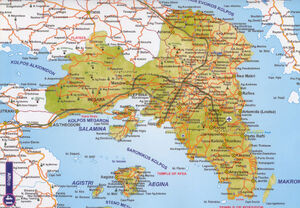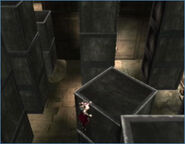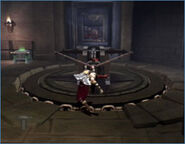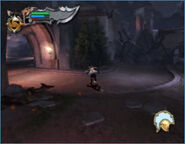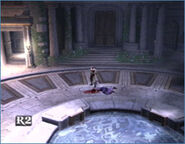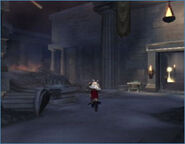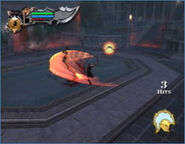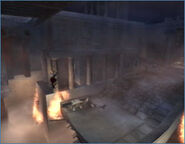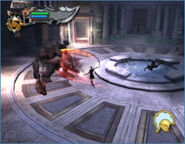Athens is a Greek city that first appears in God of War (2005). It is the city of Athena, and in the game, Ares invades it with his army. Kratos travels to Athens in search of the Oracle of Athens, and by the end of the game, he battles and kills Ares, ultimately becoming the new "God of War".
In God of War III, Athens was presumably destroyed by the flood caused by Poseidon's death. However, with the release of Hope, it is possible that the city, along with the rest of Greece, is being rebuilt.
Greek History
Athens is the capital of Greece. It was the city of the great goddess Athena. Also known for their great rivalry between Sparta, the Athenians were the creators of democracy, architecture, philosophy and the still traditional Olympic Games. It is also the site of the decision of who would rule Athens. Poseidon and Athena participated in this. Poseidon gave the Athenians sea salt, while Athena gave them the olive tree (one of her symbols), which is how Athena won the contest.
In God of War
In the opening of God of War: Chains of Olympus, the Athenian Army defends the coastal city of Attica, one of the allies of Athens from the invading Persian Army and its Basilisk. Later in the story, we enter the city of Marathon, one of the battlegrounds of the Greco-Persian wars where the Athenians stood against the great empire from the East.
As Poseidon and Athena recalled during the novelization of the first God of War, their ancient dispute over the patron-ship of the city did happen, with the citizens of Athens preferring the Olive Tree of the Goddess of Wisdom and War to the mighty Poseidon's salt spring. To compensate the Sea God and soothe his wrath, the coastal city made many sacrifices and tributes to the King of the Oceans, which allowed them to become a mighty naval power.
Athens was a hub of Greek culture, with even Mimir having visited the city once. Next to Poseidon and Athena, the citizens also devoted a lot of worship to Zeus, the father of Athena and King of the Gods.
In God of War, Ares lays siege to the city (more commonly known as the Siege of Athens) mostly out of his hatred for Athena herself, aswell as being embittered for her "tricking" him of the Lordship over the Armies of Humanity sometime prior to the games events. With that, Kratos is requested by the Gods of Olympus to save the city from the God of War.
It is not known how many of the Gods reacted to Ares brutal onslaught, with Zeus being mostly conflicted about the insult and challenge to himself, as many of his worshippers and temples in the great city have been singled out and destroyed.
His daughter Artemis didnt really care either, more concerned with undead incursions into her own domain, the Wilderness. The Messenger of the Gods, Hermes found the battle and agony of the city amusing and teased his sister Athena about it, before his father Zeus ordered him to deliver an order to Ares, which turned his joking mood around instantly, with Athena almost laughing.
Poseidon, known for his grudges and spite, had special disregard for the city, despite the long standing tributes and honors he recieved from its people. After facing his nephew Ares and sorting out their differences after the Hydra incident, the War God announces his intention to march on Athens and, out of suppossed respect gives his uncle a chance to stop it, if only he so wished. The Ruler of the Oceans declared that Ares can "burn it to the ground and salt the earth" for all he cared.
During his quest, Kratos comes across different Athenians, for whom he as a Spartan holds next to no regard, being even glad that his quest is to save the city, not the citizens, for he can "barely look at them".
Athenian Citizens
These are the citizens of the Greek city of Athens. All of the citizens are unarmed, and do not affect the outcome of the game. In God of War, during the Siege of Athens, they are seen all throughout the city, running in terror from the minions of Ares. Optionally, Kratos can kill them for Green Orbs. Grabbing a citizen will make Kratos stab them in the chest repeatedly several times, until they die.
Key Holder Woman
| “ | I know who you are, I know what you've done...monster! | ” |
–Athenian Woman | ||
When Kratos enters the large building in the Athens Town Square, a woman sees him, and flees in terror. Kratos then follows her up and through the building, and all the while she's shouting for him to stay away. Eventually, she ends up running to a balcony overlooking the town square. There, she tells Kratos that she knows who he is, and what he had done. Kratos then attempts to explain, but she continues backing up, and falls off the balcony to her death. Kratos can then go to her dead body, and get the Gold Key, which unlocks a door to the next part of the city.
Athenian Bridgeman
| “ | No... no... I won't let them get me. They won't get across. These monsters, they'll... they'll tear me apart! | ” |
–Athenian Bridgeman | ||
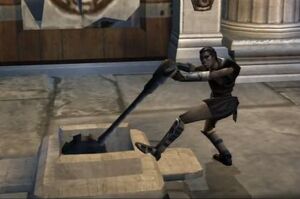
During his travels through Athens, Kratos encounters a man responsible for opening and closing the bridge on the Rooftops of Athens. Kratos demands the man to release the lever and extend the bridge, but the man doesn't, in fear of being killed by the invading monsters. Kratos, labeling the man a coward, then takes out the bridge man from a distance using Zeus' Fury, thus releasing the bridge.
Oracle of Athens
| “ | Kratos! Praise Athena you've arrived! | ” |
–Oracle | ||
The most important Athenian in God of War, the Oracle is in peril, requiring Kratos to rescue her. Afterwards, she aids Kratos by opening the gate to the Desert of Lost Souls and informing him of Pandora's Box. When Kratos returns from the Underworld, he finds the Oracle badly wounded, claiming that Ares has won and that there is no hope. She most likely dies after Kratos kills Ares.
Athenian Soldiers
| “ | The beasts have taken Athens! | ” |
–Athenian Soldier | ||
These armed warriors committed to their duty to protect the city from the minions of Ares. The army of Athens even assaulted the God of War himself; this, however, led to their deaths. The Athenian soldiers suffered heavy losses and casualties during Ares' attack.
God of War: Ghost of Sparta
The city can be seen in the background during the final boss battle with Thanatos. After the city was reduced to rubble in the first game, it looks like the city has been rebuilt in this game.
God of War II Novel
During the events of God of War II, Athens was still rebuilding from the costly siege. The city had survived, but reconstruction was hard, not just due to the sheer ruin, but also the new found power of Sparta, with the divine favour of Kratos, the successor of Ares. Many Athenians feared that if their great city tried to return to its former strengh, they would be attacked and destroyed by their old arch-rival.
In the desolation and sour mood in the entirety of Greece, as the new God of War Kratos destroyed all the great city-states much like Ares did to Athens, some mortals in the ruined city began building small, modest shrines and places of worship for Gaia and the Titans, seemingly feeling the unease on Olympus and how the King of the Gods couldnt care less about them.
Athena takes notice of this and finds it strange, given how the mortals cannot possibly understand anything about the old and defeated Titans, and that despite the current turmoil in the pantheon, the Gods of Olympus still make their presense and authority felt across the world. The Goddess decides not to tell this to her fellow Olympians like Hermes, in fear of her fathers wrath falling upon the Athenian people.
Unintentionally, during a heated discussion with Zeus she lets it slip, but without specifically mentioning Athens, which turned out to be fortunate for the already suffering city, as the King of the Gods lost all pretense of control and destroyed Sparta to punish Kratos for all his insolence, the newest one being allying himself with the Titans, who the son of Cronos still hated with immeasurable fury.
God of War III
Following the death of Poseidon, it is safe to assume that the city was wiped out by the mass flood that covered all of Greece.
Objects/Treasures
Trivia
- A Wilhelm scream can be heard when Kratos kills the bridge man.
- The Athenian citizens and women, can be selected as a "creature" to fight in the Arena of the Fates, in God of War II. They are extremely weak, and, when selected, they will run around the arena, just like they did in Athens. Kratos can kill them in the same way as well.
- Athens presumably is the least powerful in the term of military strength in all of Greece, given its pacifism. Megaera even taunts Kratos that "[he] fought like an Athenian".
- Poseidon considers "Athens" to be a terrible name for a city. In the event of his victory in the old dispute with Athena, the city would have been named "Poseidia", which would have been "more melodious", as his niece admitted.
